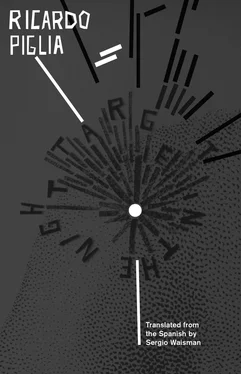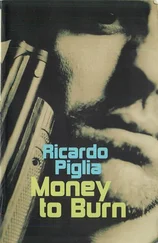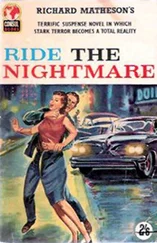Ricardo Piglia - Target in the Night
Здесь есть возможность читать онлайн «Ricardo Piglia - Target in the Night» весь текст электронной книги совершенно бесплатно (целиком полную версию без сокращений). В некоторых случаях можно слушать аудио, скачать через торрент в формате fb2 и присутствует краткое содержание. Год выпуска: 2015, Издательство: Deep Vellum, Жанр: Современная проза, на английском языке. Описание произведения, (предисловие) а так же отзывы посетителей доступны на портале библиотеки ЛибКат.
- Название:Target in the Night
- Автор:
- Издательство:Deep Vellum
- Жанр:
- Год:2015
- ISBN:нет данных
- Рейтинг книги:3 / 5. Голосов: 1
-
Избранное:Добавить в избранное
- Отзывы:
-
Ваша оценка:
- 60
- 1
- 2
- 3
- 4
- 5
Target in the Night: краткое содержание, описание и аннотация
Предлагаем к чтению аннотацию, описание, краткое содержание или предисловие (зависит от того, что написал сам автор книги «Target in the Night»). Если вы не нашли необходимую информацию о книге — напишите в комментариях, мы постараемся отыскать её.
is an intense and tragic family history reminiscent of
, in which the madness of the detective is integral to solving crimes.
, a masterpiece, won every major literary prize in the Spanish language in 2011.
Ricardo Piglia
Target in the Night — читать онлайн бесплатно полную книгу (весь текст) целиком
Ниже представлен текст книги, разбитый по страницам. Система сохранения места последней прочитанной страницы, позволяет с удобством читать онлайн бесплатно книгу «Target in the Night», без необходимости каждый раз заново искать на чём Вы остановились. Поставьте закладку, и сможете в любой момент перейти на страницу, на которой закончили чтение.
Интервал:
Закладка:
“How’re the girls doing?”
“Sit down, have a drink with us,” Sofía said.
“No, I’m moving on.”
“You’re going back already?” Ada asked.
“I’m staying for the trial.”
“We’ll miss you,” Sofía said.
“What’s going to happen?” Emilio asked.
“Everything will work out. Everything always works out around here,” Ada said.
There was a silence.
“I wish I was a fortune-teller,” Emilio said. “So I could read your thoughts.”
“We take turns with our thoughts,” Ada said.
“Yes,” Sofía said. “When one of us thinks, the other rests.”
They kidded around for a while longer, told him some local jokes, fairly loopy, 40until Renzi finally said goodnight and went up to his room.
He needed to work, organize his notes. Renzi was restless, scattered, he felt as if he’d never been with Sofía. I was inside her , he thought, a stupid thought. The thought of an idiot. “You screw a chick, she never forgives you,” Junior would say, with his little cynical and winning tone of voice. “ Unconsciously , of course,” he’d clarify, opening his eyes wide, knowingly. “Look, Eve had the first orgasm in female history, after that everything went to hell. And Adam had to go off to work.” He’d had loads of women, Junior had, and to every one of them he’d explain his theory about the unconscious battle of the sexes.
After a while Emilio picked up the telephone and asked for his answering service in Buenos Aires. Nothing important. Amalia, the woman who cleaned his apartment, asked if she should keep going on Tuesdays and Thursdays even though he wasn’t there. A woman who didn’t leave her name had called and left a telephone number. Renzi did not bother to write it down. Who could it be? Maybe Nuty, the cashier from the Minimax supermarket around the corner from his house, with whom he’d gone out a couple of times. There were two messages from his brother Marcos, calling from Canada. He wanted to know, the woman from the answering service told Renzi, if he’d already emptied out the house in Mar del Plata and put it up for sale. He also wanted to know if it was true that Perón was coming back to Argentina.
“What did you say?” Renzi asked.
“Nothing.” The woman seemed to smile in the silence. “I only take messages, Mister Emilio.”
“Perfect,” Renzi said. “If my brother calls again, tell him that I haven’t checked my messages and that I’m not back in Buenos Aires yet.”
The family house on España Street had been left vacant for a few months after his father’s death. Renzi had traveled to Mar del Plata and gotten rid of the furniture and the clothes and the pictures on the walls. He’d boxed the books and put them in storage, he’d see what to do with them when the house was finally sold. There were also a lot of papers and photographs, and even a few letters Renzi had written his father when he was a student in La Plata. The only thing he took with him from the bookshelves was an old edition of Bleak House that his father had purchased in a used bookstore somewhere. Renzi had discovered — or he thought he’d discovered — a connection between one of the characters in the Dickens novel and Melville’s “Bartleby.” He thought he might be able to write an article about this and send it to Junior, along with the translation of the chapter from the Dickens novel, so his newspaper would leave him alone. 41
Apparently his brother was going to cancel his trip. If he finally sold the house and they split the money, he’d get about thirty thousand dollars. With this money Renzi could quit the paper and live a while without working. Dedicate himself to finishing his novel. Isolated, without any distractions. Out in the country. The expiatory goat runs away to the deserted countryside. Straight to where the sun hides / inland I must ride . But living in the country was like living on the moon. The monotonous landscape, the chimango birds of prey circling above, the girls who amuse themselves.

39 Croce had intuitively understood the basic thought process. The evidence was known a priori, no empirical discovery could invalidate it. Croce called this method of deduction playing it by ear . And he wondered: Where’s the music when one plays it by ear?
40 A man in the country, riding a spirited colt in the plains at dawn, a splotch on the bright line of the horizon. In the distance, a gaucho drinking mate under the eaves of his country house. When the rider passes in front of the house, the country man at the house says hello. “Nice little morning,” the rider says. “I made it myself,” the other answers, adjusting the shawl on his shoulders.
41 “Chapter 10 of the novel “The Law-Writer,” is centered around the copyist Nemo (No One). Melville (who wrote “Bartleby” in November of 1853) probably read that chapter of the Dickens novel in April of that year, when it was first published in Harper’s magazine in New York. Dickens’s Bleak House which narrates the story of an endless trial and describes the world of the courts and its judges, was much admired by Kafka” (Note by Renzi).
19
The trial was an event. It was actually a hearing, not a trial. Still, everyone in town took it as a decisive event and referred to it as the lawsuit, the trial, the proceedings —depending on the point of view of the speaker — to indicate its transcendent nature. Like every transcendent occurrence, it was related — or so everyone thought — to justice and truth, but what was really at play behind these abstractions was the life of a man, the future of the region, and a handful of very specific, practical questions. You couldn’t say that there were two equal sides opposing each other, because the two opposing sides were not equal. And yet, one had the impression of attending an actual contest. On the streets of the town that day small groups of people commented time and again on the facts, as if all past history was to be decided in the lawsuit against Luca Belladona, or in the lawsuit that Luca Belladona had initiated against the municipality — depending on the point of view of the speaker. What was being litigated, apparently, was the $100,000 that Luca was seeking to reclaim. But plenty of other things were at stake, too, all of which became evident as soon as Cueto started to speak and the judge nodded along to every one of the Prosecutor’s statements.
The judge, the Honorable Gainza, was a justice of the peace; that is, a municipal functionary assigned to resolve local disputes. He sat on an elevated dais, at the front of the Misdemeanor Court of the Municipality, with a court clerk to his side. The prosecutor Cueto was at a table below, to the left. Sitting next to Cueto was Saldías, the new Chief of Police. At another table, to the right, was Luca Belladona, dressed in his Sunday best, with a gray shirt and a gray tie, very serious, with papers and folders in his hands, occasionally consulting with the ex-seminarian Schultz.
A lot of people were authorized to be present at the hearing. Madariaga was there, as well as Rosa Estévez, several estancia owners and auctioneers from the area, and even Cooke the Englishman, the owner of the horse at the center of the dispute. The Belladona sisters were there, but not their father. Everyone was smoking and talking at the same time, the windows in the room were open, and you could hear the rumble of the voices from those who hadn’t been able to get in and were crowded, instead, in the hallways and the neighboring courtrooms. Inspector Croce wasn’t there either, although he’d already signed himself out of the asylum and was living now above the Madariaga Store and Tavern in a small room that he was renting there. Croce thought that everything was already fixed, and he didn’t want his presence there to legitimize his rival, Cueto, who was certain to win the hand with his shady dealings. There weren’t very many women present; the five or six who were there stood out because of their self-assured attitude. One of them, a beautiful woman — Bimba, Lucio’s wife — sat impassively, haughty, behind her dark sunglasses.
Читать дальшеИнтервал:
Закладка:
Похожие книги на «Target in the Night»
Представляем Вашему вниманию похожие книги на «Target in the Night» списком для выбора. Мы отобрали схожую по названию и смыслу литературу в надежде предоставить читателям больше вариантов отыскать новые, интересные, ещё непрочитанные произведения.
Обсуждение, отзывы о книге «Target in the Night» и просто собственные мнения читателей. Оставьте ваши комментарии, напишите, что Вы думаете о произведении, его смысле или главных героях. Укажите что конкретно понравилось, а что нет, и почему Вы так считаете.












